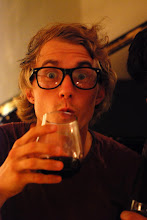I am becoming a subscriber to Bertrand Russell's idea of idleness.
Speaking of my generation, I feel that we have forgotten how to do nothing at all. This is not to be confused with sloth. This is my rant, straying on a slight tangent from Russell's advocacy for idleness to its relationship with being. My advocacy for doing nothing at all, which surely is an art.
Somewhere along our journey, some of us, have became obsessed with the absolute marriage of ideas and utility; the practice of only practical knowledge, and only as a span to some working man's definition of production. Having spilled into relationships, we forget that friendship, and even marriage itself, is not a means to an end; not merely a means of reproduction so that race is carried on. In sickness and in health is more than a simple forecast of physical condition, it is a matter of being.
We are losing touch with knowing for knowing's sake; being as a means of existence. We neglect our potential. As this philosophy of neglect spills into academia, knowledge takes second stage, and information assumes the lead. I am surrounded by students who seem to care more about a rigid definition of graded advancement than about where they are today. Creativity becomes the orphan of a so-called progress.
Watching, I find myself in a state of depression. This will continue to be a theme.
Children are the epitome of creative essence. They are the saplings of true knowledge. Their inquisitive nature and natural willingness to fail, an expression of wonder and existence. In early years, a lack of inhibition is rarely passed off as an impediment to a child's nature. Instruction does vary and at times is left to chance. Sadly, some roots only spread across the ground.
It is a rare adult who can stroke a cold, moss-covered stone for minutes upon end and then clench it in a fist as a prize, but a child will. In youth, a stick is worthy of affection. The adoration of an ant hill, worthy of a crouching stare and rust-colored knees.
The world becomes worthy of full intention, and dirty knees, a necessary ingredient.
With speech, expression becomes vocal, and the questions are asked: why and how? How do I live? Why do I sneeze? How does it work? Why do birds fly, and why can't I? Why does the sun set? Why can't I stay up? Why are you crying? Why?
At some point, we stop asking questions. Part of it is balance; contemplation before a fall. Yet often 'because' becomes good enough for the grown. Time is also an excuse, though in many cases I reflect on, unworthy.
We have pigeon-holed the world, defined it, if not by our words than by our actions. There is often more revelation in what is done than what is said. If this is true, if we cannot exist in a balance of action with still 'contemplative thought,' then sadly our self-created schedule becomes a prison; endless toil, a pathetic ball and chain.
Rather than sit in what meaning is, we create meaning to fill a void; action to make ourselves comfortable with reality.
I used to work with a man named Pete. We fought fires together, and in rare moments of solitude, sat in the dust of empty deer trails. The forest was silent, crusted with burnt wood, the aroma of smoke, and stray sunlight turning ashen crust into obsidian. When the season ended Pete disappeared to a lonely ranch somewhere in middle-of-nowhere, Idaho. The crew joked loud enough so that he could hear: teased him about being out of touch through the winter. Pete never replied. He left that autumn.
I smile just thinking about it. Pete, one of the hardest workers I have known, was okay with silence, with rest, and idleness. I imagine him out there, splitting firewood, snowshoeing the hills, white from horizon to horizon, and sitting.
Everything in balance.
Being is elusive, silence taught to be awkward. But stop and feel the air about your fingers. Listen to your own breath. This is a beginning.
"The day is real;
the sky clicks securely into place over the mountains,
locks round the islands, snaps slap on the bay.
Air fits flush on farm roofs;
it rises inside the doors of barns and rubs at yellow barn windows.
Air clicks up my hand cloven into fingers and wells in my ears' holes,
whole and entire.
I call it simplicity,
the way matter is smooth and alone."
- Annie Dillard
